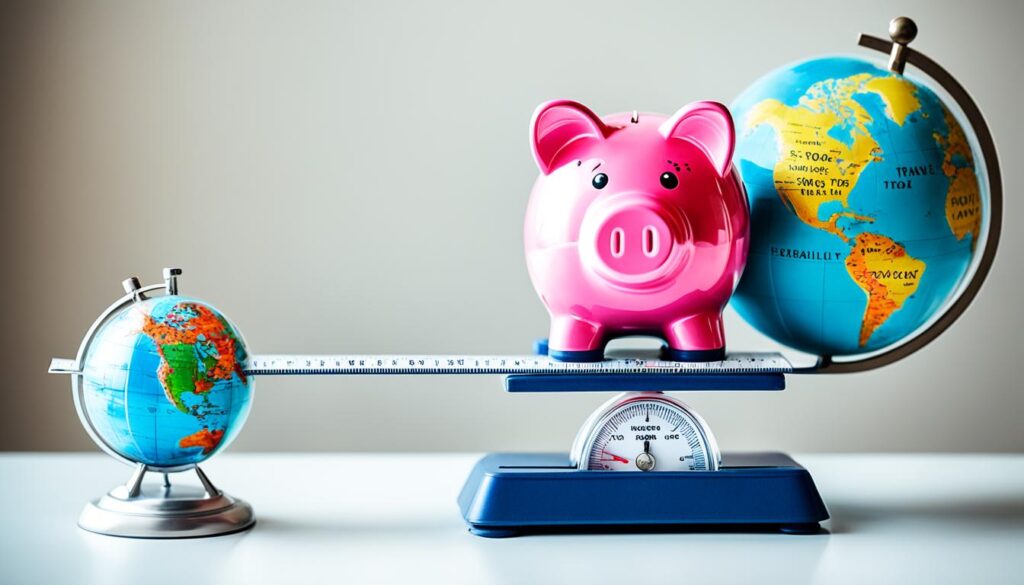Surprisingly, nearly 50% of millennials have admitted to spending money they didn’t have to keep up with their friends1. This statistic not only underscores the allure of travel versus saving for the future, but also raises critical questions about financial planning and setting priorities that align with one’s values. As young adults navigate the pressures of societal expectations, deciding whether to invest in memorable travel experiences or secure their financial future becomes vital. It’s essential to explore how these choices can affect long-term well-being and happiness, considering both budgeting tips and personal aspirations that shape one’s financial landscape.
Key Takeaways
- Understanding the trade-offs in financial planning influences life goals.
- Travel can be fulfilling but should not overshadow financial responsibilities.
- Exploring budgeting tips can help balance travel and future savings.
- Establishing priorities early can lead to healthier financial decisions.
- Having an emergency fund is crucial before embarking on travel adventures.
Understanding the Importance of Financial Priorities
Establishing clear financial priorities is crucial for effective money management. It allows individuals to navigate through various financial obligations while aligning short-term and long-term goals. Defining what is important in your financial life serves as a foundation that can help prioritize tasks such as retirement savings or traveling.
Defining Your Financial Goals
Setting tangible financial goals is essential for guiding your financial decisions. Financial experts recommend establishing short-term goals that lay the groundwork for future success, which may include creating a budget, reducing debt, and starting an emergency fund2. Studies indicate that individuals who set specific savings goals save 25% more compared to those without a defined target3. Knowing what you want to achieve will also inform decisions related to retirement savings, which is pivotal for long-term financial stability.
The Role of Emergency Savings
Emergency savings play a significant role in overall financial security. Experts suggest that saving at least three to six months’ worth of living expenses helps cover unexpected financial obligations, such as medical emergencies or job loss24. This financial cushion supports effective money management and peace of mind, allowing individuals to pursue other financial ventures without undue stress. Recent surveys show that 73% of people find having a budget reassuring, significantly impacting their overall financial situation3.

Travel vs. Saving for the Future: Weighing the Options
Choosing between travel and saving for the future involves weighing immediate satisfaction against long-term security. Each option presents unique benefits, appealing to different aspects of life. Travel budgeting often becomes essential for those with wanderlust, allowing young adventurers to explore the world without derailing their financial goals.
The Joy of Traveling Young
Traveling while young offers the chance for personal growth and memorable experiences. The average length of a big trip is about three weeks, giving travelers a substantial timeframe to immerse themselves in different cultures and adventures5. Many young travelers prefer multiple stops, which highlights their desire for diverse experiences5. Furthermore, the creation of a travel fund through savings apps has become a popular strategy for budget-conscious individuals looking to manage their finances while indulging their wanderlust5.
Securing Your Financial Future
On the other hand, the importance of securing one’s financial future cannot be overstated. While enjoying immediate pleasures through travel is appealing, establishing a solid savings foundation prepares individuals for life’s responsibilities. In Australia, for instance, 29% of people use extra cash to cope with increased living costs while a considerable portion prioritizes saving, aiming for a rainy day fund and travel6. Millennials have shown a significant focus on travel goals, but a substantial one in four respondents are saving for home ownership and one in five for retirement6.
Both paths require savvy financial decisions. Individuals must evaluate their priorities against future aspirations, ensuring their choices align with their overall life goals.

| Aspect | Travel | Saving |
|---|---|---|
| Focus | Personal Growth, Cultural Exposure | Financial Security, Future Readiness |
| Averages and Goals | 3 Weeks Trip Duration, Multiple Stops | $17,000 Average Savings Goal |
| Common Strategies | Travel Fund, Savings Apps | Emergency Funds, Retirement Savings |
| Age Group Emphasis | Millennials Prioritize Travel | Home Ownership and Retirement Focus |
Creating a Balanced Budget for Financial Freedom
To achieve financial independence, it’s crucial to develop a balanced budget that aligns with your financial priorities. This process requires understanding your income flow, tracking your expenses, and setting clear savings goals. Implementing effective budgeting strategies can help you manage your money wisely, enabling you to enjoy travel without compromising your future financial stability.
Steps to Effective Budgeting
Effective budgeting involves several practical steps that can guide you towards financial freedom. First, implement a structured budgeting approach based on the changes made in 2011, which emphasize the necessity of a solid financial plan over time7. Track your spending habits diligently, as recognizing where your money goes is vital for managing expenses7. Next, create a budget that caters to all income levels, ensuring that whether you earn $30,000 or $300,000, you have a plan7.
Another essential step is to pay yourself first. This means prioritizing savings before addressing other expenses to secure your financial future and prepare for potential challenges like retirement7. Tools like Excel sheets or budgeting apps can facilitate this process, making budget tracking more manageable. Individuals who prefer tangible budgeting methods might find the envelope system a beneficial alternative7.
Automating financial processes can also ensure consistency. Set up automatic contributions to retirement accounts and streamline bill payments to avoid late fees7.
Prioritizing Your Savings Goals
Understanding how to prioritize your savings goals is paramount for effective money management. Begin by distinguishing between essential needs, such as food and shelter, and luxury expenses to allocate your resources wisely7. It’s important to strike a balance by providing for unexpected expenses while maintaining funds for leisure activities7.
Recent survey results highlight that 47% of respondents consider independence from family and friends as an indicator of financial freedom. Following closely, 44% associate achieving a specific net worth with this sense of liberty8. Additionally, regular contributions to retirement accounts are viewed positively by 42% of those surveyed8. By clarifying your savings priorities based on these insights, you can shape a financial strategy that resonates with your personal goals.
| Type of Expense | Examples | Priority Level |
|---|---|---|
| Essential Needs | Food, Shelter, Clothing | High |
| Unexpected Expenses | Medical Bills, Repairs | Medium |
| Leisure Spending | Dining Out, Entertainment | Low |
| Long-term Savings | Retirement Funds, Investments | High |
Applying these budgeting tips allows you to gain control over your finances while achieving your travel aspirations and securing your future8.
Financial Planning: Steps to Make the Right Choice
Effective financial planning is vital for determining the right balance between short-term desires, such as travel, and long-term aspirations like retirement goals. The first step is understanding the difference between short-term and long-term financial goals. Short-term objectives, which can range from six months to five years, may include travel or building an emergency fund, while long-term goals typically span ten years or more and focus on substantial savings instruments like retirement accounts. For instance, contributing to a 401(k) could significantly enhance retirement savings, especially when employers provide a match up to a certain amount, making this an advantageous investment strategy9.
Short-term vs. Long-term Financial Goals
When prioritizing your financial planning, it’s essential to set clear timelines for each goal. Starting to invest early in accounts like an IRA can benefit from compound growth, as the longer funds are invested, the more they can grow. For retirement accounts, the annual contribution limit in 2024 is $23,000 for a 401(k) and $7,000 for an IRA10, which reflects the importance of planning ahead to meet these retirement goals. Effective budgeting not only allows for saving and investing but also provides funds for discretionary expenses, ensuring a balanced approach to both immediate and future financial needs.
Assessing Your Current Financial Situation
Assessing your current financial situation is crucial in making informed choices. This involves evaluating income levels, existing savings, and debts to determine how much can safely be allocated toward short-term pleasures like travel while still building a secure future. Recommended minimum emergency savings start at three months of living expenses, with a more realistic goal being six months to a year11. Regularly reviewing personal financial plans and seeking the guidance of a financial professional can further optimize your financial planning efforts, ensuring that all aspects, including investments and insurance needs, are appropriately addressed9.
FAQ
How can I balance my desire to travel with saving for my future?
What should my financial goals include when planning for travel?
Why is having an emergency fund important before pursuing travel dreams?
How can travel contribute to my personal growth?
What are practical budgeting tips for saving while traveling?
How do I assess my current financial situation before deciding to travel or save?
Can I travel and save for retirement simultaneously?
Source Links
- https://www.cnbc.com/select/how-to-balance-spending-now-and-saving-for-later/
- https://www.investopedia.com/articles/personal-finance/100516/setting-financial-goals/
- https://www.m1cu.org/news/articles/the-importance-of-budgeting-and-saving-for-the-future
- https://smartasset.com/financial-advisor/why-is-it-important-to-set-financial-goals
- https://www.npr.org/2024/04/22/1199886066/how-to-plan-big-trip-travel-tips
- https://www.morningstar.com.au/insights/personal-finance/251462/travel-more-with-a-better-alternative-than-saving-for-holidays
- https://www.hollyscherer.com/budget/
- https://libertygroupllc.com/blog/financial-independence-vs-financial-freedom-whats-the-difference/
- https://www.usbank.com/financialiq/manage-your-household/personal-finance/financial-planning-guide-for-today-and-future.html
- https://www.nerdwallet.com/article/investing/what-is-a-financial-plan
- https://www.principal.com/individuals/build-your-knowledge/step-step-guide-build-personal-financial-plan

